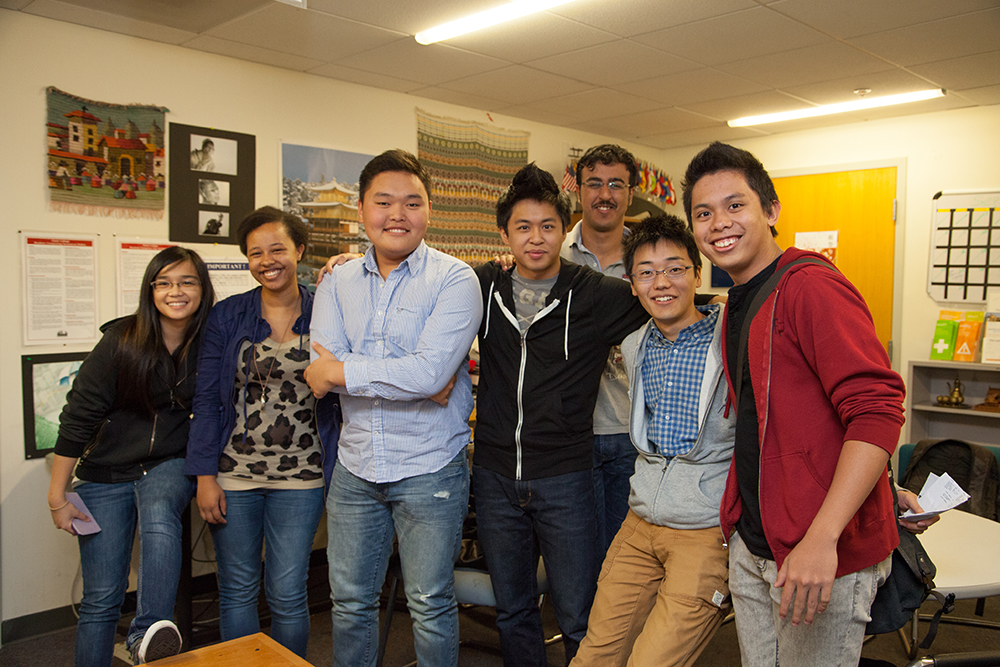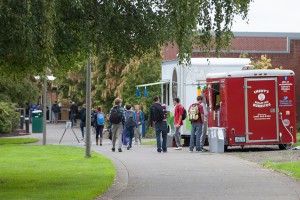Clark College starts the new academic year with expanded programs, locations, hours, and vision

International students make new friends in the International Student Lounge on the first day of fall quarter. Fall 2013 marks record enrollment for International Programs.
On Monday, September 23, Clark College opened the doors for its 2013-2014 academic year. The college welcomed 13,373 students on opening day, down slightly from fall 2012, when the college welcomed 13,927 students.
The start of fall quarter is always a time of new beginnings at the college, but this year is seeing a number of changes to the way the college enhances student learning. Some highlights:
- Expanded hours at CTC: For the first time, Clark College at Columbia Tech Center will be open for credit classes on Fridays. The expanded schedule will make it easier for residents of East Vancouver to complete their degrees entirely at CTC, without traveling to take classes on Clark’s main campus.
- Expansion into the Gorge: In response to demand from local businesses and residents, Clark College is offering college-level classes to the communities of the Columbia River Gorge through its new satellite location in the Wind River Education Center in Carson. Until now, residents had to travel 20 miles or more to attend the nearest community college—and that college is located out of state, in Oregon.
- New Phlebotomy program: Clark College has redesigned its Phlebotomy certification program and relocated it to specially configured classrooms and labs on the campus of Washington State University Vancouver in the college’s health care instruction building, which also houses the college’s Nursing and Pharmacy Technician programs.
- Bachelor’s degrees in Health Informatics : Clark College and Bellevue College have signed an articulation agreement that allows students at Clark to earn a bachelor’s degree in Health Informatics Information Technology (HIIT) from Bellevue through online and remote classes—without leaving the Clark College campus. “In our ongoing conversations with regional employers, we realized there was a need for Health Informatics Information Technology professionals and responded quickly to that need, but we also realized that there would be a need for students to take their education to the next level,” said Debra Ortiz, director of allied health programs at Clark College.
- Record number of Running Start and international students: Clark expects to see more than 1,770 students enrolled in Washington state’s popular Running Start program, which allows high school students to earn college credit for little or no cost. This number is a 5-percent increase over last year’s Running Start enrollment. Meanwhile, Clark is also seeing a record number of international students at the college this year. A total of 103 students from 31 different countries are attending the college this quarter.
- Mechatronics offers evening classes: Clark College’s state-of-the-art Mechatronics program will begin offering evening course, allowing workers to retrain for modern industrial jobs without leaving their current positions. This expansion is designed to boost the region’s economy; it was prompted by local businesses who wanted more opportunities to retrain their employees.
- New food carts serve campus while Culinary Arts program is on hiatus: Clark is discontinuing its Culinary Arts – Food program while it launches an ambitious new redesign of the program that will make it more responsive to modern culinary trends. Three privately owned food carts are supplying food service to the college while the program is overhauled. The college’s widely respected Culinary Arts – Bakery program will continue operating during this time.
- Water-bottle filling stations: Students and college administration have worked together to help preserve the environment by setting up water-bottle filling stations around the main campus, thereby reducing the number of disposable plastic water bottles bought and discarded at the college.













